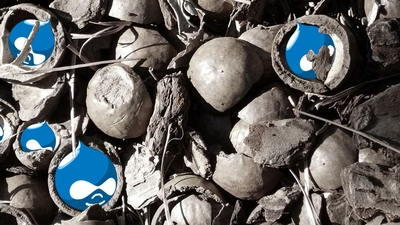Which website content management system is right for your business?
WordPress and Drupal are among the most widely used Content Management Systems (CMS). Both are open-source solutions, meaning that the core offerings are free to use. They allow users to create and manage content over one or multiple websites, but there are some key differences. Understanding how these platforms work and their relative merits will help you make an informed decision as to which one is right for your business.
WordPress
WordPress is an easy to use 'off the shelf' solution and perhaps why it has the largest market share. Originally a simple blogging tool, over the years it has evolved to become a flexible and functional CMS. WordPress is ideal for small to medium sized businesses requiring an uncomplicated but functional website.
The predominantly template-based proposition allows a professional looking website to be built quickly and this particularly appeals to businesses looking for an entry level website. However, the brand conscious startups or small family businesses may find that compromises are likely to be needed in regards to overall presentation of your content to fit with the WordPress templates.
WordPress has a modular approach, which means that it offers a wide selection of standard themes, plugins, and integration options to blend. Even with a relatively small amount of IT competence (and patience), a business owner can build a practical website which will get their business noticed.
However, advanced customisation of the layout or functionality, prove to be challenging and potentially costly in the long run. In addition, whilst the WordPress core is open source software, themes, ecommerce modules and plugins are all commercial products which may not create a unified user experience.
Many organisations may find that WordPress is "enough" for what they need and are happy to accept its limitations in light of the ease of getting up and running. Equally, we often hear from people that have been frustrated with their WordPress sites and struggle to achieve what they need.
Drupal
Drupal was established before WordPress though it is not as widely known. It is popular with businesses in need of more interactive functionality, high content volumes or more data driven solutions, in addition to those seeking to strengthen their online security, reduce risk and achieve stringent compliance measures. Drupal is trusted by some of the best known organisations in the world such as Tesla, University of Oxford and The Children's Society charity. It allows a superior degree of personalisation, which delivers a better customer experience as the website is tailored around your specific products or services rather than a one size fits all.
Due to the way websites are built, customised, and extended on each platform, Drupal supports the achievement of enterprise business goals. This is often a compelling factor developers use to support their business case for Drupal. It is considered more secure and trusted by some of the biggest companies including security conscious organisations such as defence or Government organisations. This is probably why a high proportion of the world's top 500 ranking websites are built on Drupal. A further advantage is that the front end is custom built and so can accurately reflect a company's brand and cope with multi-territory and multilingual businesses.
With this customisation comes the need for a developer as building a Drupal site is beyond the capabilities of most users. It is for this reason that Drupal tends not to be the platform chosen by many startups and small family businesses, but by the larger more established businesses wanting to update and upgrade their website.
What do the stats tell us?
WordPress is clearly the more popular CMS, when compared to Drupal, averaging a consistent ~35% market share of all UK websites across the top 1 million, 100k and 10k sites (source). This consistent popularity of WordPress can be put down to the high number of marketing agencies using it as the go-to platform for quickly creating websites with relative ease (often with pre-built templates); the number of cheap website hosting options that are well integrated for WordPress support; and customer-friendly one-click installers.
However, this does not tell the whole story because with such ease there are compromises that are made - see the aforementioned limitations with WordPress. Drupal, although scoring a lower number of sites in percentage terms, shows an interesting trend. The statistics show that the difference between the top 1 million websites (in the UK) versus the top 10 thousand sites increases from just 3.45% to 12.82% (at time of writing). What does this tell us? Clearly, there's a tendency for the more popular sites to favour Drupal. This is because organisations running sites with more traffic value higher security (they have more at risk), have specific requirements (e.g. custom tools and content requirements), and seek to highly optimise for performance - e.g. SEO and refined user experiences.
In summary
Which CMS you choose for your business will depend upon what you need your website to do, your budget, and long-term plans. For a relatively quick and simple out of the box solution WordPress should be able to meet most of your needs. If your requirements are more complex or you require more customised functionality and robust security, Drupal may be the superior alternative. While developing a Drupal site may take longer to develop, and cost more, it may still be a better long-term investment for your business.
- Are you already running a WordPress site and are frustrated by its limitations?
- Would you like to understand more about the differences between WordPress and Drupal?
- Are you looking to upgrade your website and want to explore alternative solutions?
If so, let's chat.



